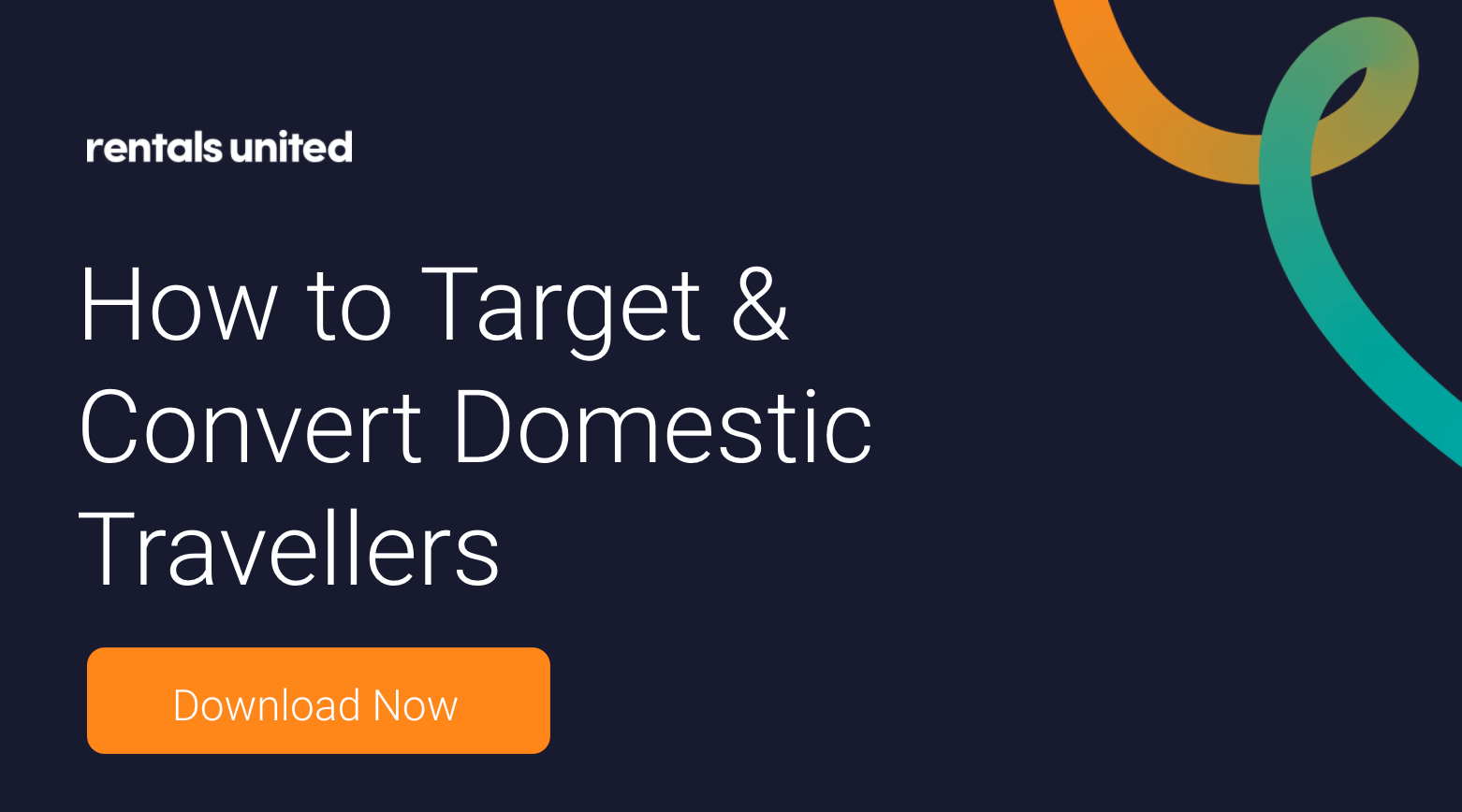In today’s competitive market, getting listed on Booking.com is a must for all accommodation providers. As one of the world’s largest OTAs, Booking.com allows vacation rental property managers to compete for the attention of millions of travellers directly alongside hotels.
As a Booking.com Premium Connectivity Partner, we are in a privileged position. Not only do we get access to priority customer support – so that property managers using our Booking.com channel manager can resolve issues quicker than anyone else – but we also get to work closely together with Booking.com. We are often the first to know about the company’s latest updates and future plans.
This time, we were able to get an inside scoop from Eric Bergaglia, Booking.com’s Global Head of Homes and Apartments. In the interview, Rentals United CMO Vanessa de Souza Lage spoke with Eric Bergaglia to learn more about:
- The latest travel trends identified by Booking.com
- The company’s new focus in the US
- Stats and insights from extensive research
- The partnership between Booking.com and Rentals United
- What the future holds for Booking.com
Read the interview below, or watch it on the Rentals United Youtube channel.
Vanessa: What’s your position at Booking.com, what are your responsibilities and how big is your team?
Eric: I am the global head of the accommodation segments. I head up all the alternative accommodation businesses globally for Booking.com, including the families and groups business as well as the longer stay segment.
All these growth segments for Booking.com are supported by teams working in Amsterdam as well as other countries, helping to support the experience functions on Booking.com for both partners and the customers, allowing us to grow with our partners in all those different segments. Obviously, alternative accommodations being the biggest one at the moment.
What are the latest trends that you can share with us?
Domestic travel is significant right now. In our quarterly earnings meeting, we announced that 85% of the room nights we had globally were for domestic . And that definitely applies to alternative accommodations.
We see international travel slowly but surely coming back. The USA is a prime example; however, there does seem to be some trepidation: 53% of US travellers still don’t feel entirely comfortable travelling abroad.
Flexibility, I think, is very important. The majority of our bookings, especially for the summer, are on flexible policies. So while we know that partners prefer to have non-refundable, 70% of our customers worldwide have put flexibility as the must-have for how they make their decision for travel and the ability to also be flexible on dates.
Non-urban, rural, natural destinations and longer-term stays are all trends we are seeing. For example, digital nomads working from anywhere.

I love the digital nomad trend. So longer stays is quite new for Booking.com, isn’t it?
Yes, indeed, until the end of last year, we never had the ability to book for more than 28 nights for various reasons. But guests last year accelerated this desire to book for longer and enabled us to go deeper into that segment.
So we did two things: number one, we provided partners with the ability to optimise 7 to 28-night availability by introducing weekly rates so that they can provide the best possible price. Number two, we also improved the discoverability and experience for the customers.
We have also started a few pilots in some cities around the world for bookings beyond 30 days. Currently, we are preparing to scale this, starting with a few countries, including the US.
Let’s talk about the US. You are expanding there at the moment. So, what can US property managers expect from Booking.com?
Booking.com is worldwide and the second-largest platform in terms of vacation rental bookings. We’ve been operating in the US for a while already. So this is not new, but definitely, I think it has been an increasing focus over the past couple of years, and this year will be a big year for us in the US.
So what’s that mean? We are going bigger with marketing. So maybe your US audience has seen the ‘Welcome Back America’ campaign that Booking.com launched, where the creatives and messaging is quite heavy on the vacation rental side of things. This is only the first step – more vacation rental specific campaigns are coming to the US.
This is an opportunity for US partners to capture guests through this billboard effect (because, as we know, 35% of direct bookings come from being present on OTAs).
And it gives partners the ability to capture a new kind of customers.
Something interesting partners should know is that on Booking.com, the majority of people come without necessarily a preference in terms of which property type they want to book. They know that they want to go to Florida with their family for two weeks and it could be a hotel or it could be a home.
But luckily, we are ready to capture all the potential guests in the coming months fully.

What’s the average number of nights guests book, and what are their budgets? Do you have these kinds of stats for us?
It very much varies, and with the current situation and restrictions, it is hard to say.
You can find all these insights on the extranet or through connectivity. We have the Market Insights API that we just released with some partners, including Rentals United.
Here you can look at all the latest booking and search trends, demand patterns, what kind of policies are the most booked in your market and more. This will give you some actionable insight, for example, if you see that there’s a lot of mobile customers coming back, maybe implement mobile rates.
Travellers, as I mentioned previously, want flexibility. So being able to make sure that you have a non-refundable and flexible rate is table stakes in the current context. And once you have that, make sure that you have a perfectly optimised property, being that amenities or explaining health and safety concerns.
Vanessa: Yes, it is so customisable. The API is incredible. I think many people don’t know how far you can go with Booking.com. I think it’s much more common in the hotel world, but property managers are still learning and we often find ourselves consulting on what would be the best rates and tools.
Related Article: Booking.com Opportunities & Promotions: Everything You Need to Know (here you can read all about the extranet, and promotions Eric was mentioned above).
So let’s talk about us. Why is it important to partner with Rentals United and what do you expect of the relationship with us?
We have been working together for years, and the feedback we get from our partners working with you and the Booking.com teams working with Rentals United is excellent.
You are a Premium connectivity partner, which means that you are one of the most knowledgeable on how things work on Booking.com, and you are one of the best in terms of connectivity. Plus, you are also on the advisory board of Booking.com, helping us improve on the offer for property managers. And that’s what we like.
Rentals United is a name that comes up almost all the time for recommendations. The knowledge you have on how to properly connect and set up properties from day one, ready to convert.
Related Article: How to create the perfect listing optimised for conversions with the Rentals United Quality Checker
Property managers are competing against hotels with 28 million listings, and 6.5 million of these worldwide are for alternative accommodations.
We (Booking.com) have lots of travellers looking for accommodation, but need to be correctly set up to succeed in this kind of ecosystem, especially in the current context where there is scarcity of demand.
Provides analysis aligned with 2022 Global Report.
With Rentals United, you are equipped for success with the right kind of setup from the get-go, and they also act on any feedback that you get or insights that you would get in terms of optimising, pricing, issues or content.

Vanessa: That’s music to my ears. Thank you, and congrats team for doing such a great job. I would like to know, what does the future hold? Booking.com is a very dynamic company. So, what’s next?
That’s a good question. I wish I knew. I think we as an industry are definitely in a much better place. The US is a great example of that. When you look at the US, you know that there’s light at the end of the tunnel. So that’s what’s great. We clearly see the appetite of travellers to come back.
And specific USA 2022 Summer Stats.
Related Article: Summer Travel Forecast: Top-Performing Channels Per Country + Booking Window Analysis
Longer stays is something that will be key. From research almost 40% of our travellers worldwide say that when they are able to travel internationally again, most likely they will travel for more than a week. So this is a very important trend for sure.
And this goes with the digital nomads working from anywhere kind of trend. Another 40% of travellers have considered working remotely and a similar number are actually also willing to quarantine if they can work from abroad.
I think international travel will come back. We don’t know exactly when, obviously, and it will take years, not months. I see some articles saying that 2022 is going to be a full recovery. I’m not sure about that, but at least we know that we are on the right path. And I think when international travel comes back, it’s important that the partners already, including being on all the relevant platforms that can give them access to the international demand.
Apart from that, I think the current crisis has changed the landscape on two levels.
One: alternative accommodation is here to stay even more than before. And I don’t think it’s going to take all the market share from hotels. But at least the awareness that you can book a home as well is something that maybe people didn’t have before. So for a platform like Booking.com where you have all accommodations, maybe you have a level playing field and even more chances to convert.
Two: flexibility. It’s not necessarily the one thing that a property manager would prefer, but this is what people want. And I think being able to have a flexible policy and also have the perfect transparency in terms of what health and safety measures you have in place, will be table stakes for everyone. If you do this right, you will be able to capture whatever is coming. Let’s see about that, but that is what I have in my crystal ball.
Are you ready to build a tech-based distribution strategy? Discover how our enterprise-level Channel Manager can get you more bookings.
